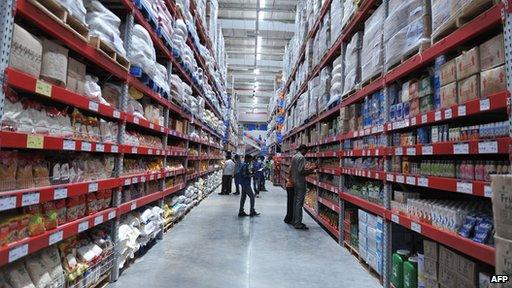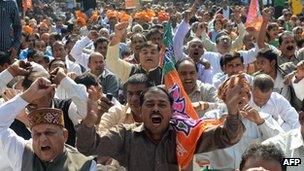India eases foreign investment rules in retail sector
- Published

Multi brand retail is seen as a key sector to attract to foreign investment in India
India has eased key rules on foreign direct investment in multi-brand retail in an attempt to attract foreign firms as it looks to boost economic growth.
Rules governing sourcing of products, infrastructure investment and selection of cities have been relaxed.
India had opened up multi-brand retail to foreign investors last year, but no foreign supermarket chain has yet entered the country.
The move also triggered a series of protests in India.
The previous rules made it mandatory for foreign supermarkets to source 30% of their products from small Indian firms.
The government has retained that requirement, but said foreign firms will be given five years in which to reach that target, giving them the option of importing goods from overseas initially.
Global chains will also have to put 50% of their initial investment in to building back-end infrastructure such as cold storage facilities.
Foreign retailers will also be allowed to set up shop in cities with a population of less than one million, which they had been barred from earlier.
'Stumbling blocks'
India, home to more than one billion people, is seen by many foreign investors as a key growth market, not least because of the sheer size of its population.
A rise in incomes and a growing middle class has further added to the country's appeal.
As a result, when the government announced that it was opening up the multi brand retail sector to foreign firms - many had hoped that foreign companies would jump on the opportunity.
However, the conditions set by the government had prompted many chains to hold back on their plans.
Some analysts said that the move to ease some of these rules was likely to generate more interest among foreign firms.
"The new rules have removed some major stumbling blocks and should encourage foreign retailers to enter India," said Devangshu Dutta, who heads retail consultancy Third Eyesight.
Political uncertainty?
However, the move has also faced opposition in India.
There have been concerns that the arrival of big name supermarkets may hurt the small retailers in the country.

The move to open up retail sector triggered a series of protests in India
Critics have argued that given their purchasing power, and the scale of the sales, big players may be able to secure supplies at a much lower rate the smaller shops.
As a result, they may be able to sell those goods at a lower price and hurt small scale retailers.
Some of India's opposition parties also have voiced their concerns against the move.
Analysts said that with national elections in India due next year, foreign firms may still hold back on any potential investment amid concerns that a change in government may see derail the opening up of the sector.
"Most retailers are still likely to wait for the outcome of the elections next year before they make a decision," said Mr Dutta.
- Published16 July 2013
- Published30 May 2013
- Published16 July 2013
- Published17 July 2013